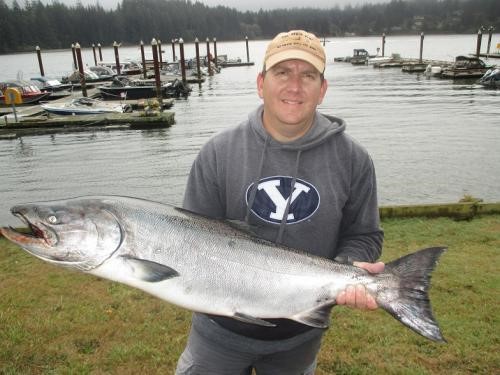Umpqua River
Umpqua River
Flowing over 200 from miles from its headwaters in the Cascade Range to the Pacific Ocean at Winchester Bay, the Umpqua River offers an almost unrivaled diversity in the eco-regions it drains, andthe species of fish it supports along with the consequential plethora of angling opportunities created. Large tributaries including the North & South Umpqua rivers and the Smith River all feed the main stem and make the Umpqua one of western Oregon's largest rivers. The headwaters emerge in the heavily forested timber lands of the Cascades, flowing generally northwest. Just past Roseburg, the North and South forks combine to form the main stem which then passes through the Coast Range and slowly meanders through small agricultural valleys and pasture land supporting scattered oak and maple groves below fir-lined ridges. The river corridor then takes on a more canyonesque character as it continues west past Elkton and Scottsburg, finally opening up to the larger estuary near Reedsport at Hwy 101. The lower estuary has a more marine-like feel as seals, gulls, and sand dunes contribute to its character. The Umpqua River has a relatively long zone of tidal influence extending all the way from Scottsburg on through Winchester Bay, its gateway to the Pacific.
Sturgeon, Salmon, Steelhead, Trout, and Smallmouth Bass comprise the more popular fisheries the Umpqua offers, while Shad, Striped Bass and Surf Perch offer additional angling opportunities. Localsboast that virtually any time of the year there is something to catch in the Umpqua. Crabbing in Winchester Bay is very popular and at times quite productive. Though Oregon's state record Chinook Salmon was caught in the Umpqua River, there may well be more passion, fame and lore connected to Umpqua steelhead fishing. A legacy of fly fishing for Summer-Run Steelhead on the North Umpqua near Steamboat runs deep in the hearts of many anglers thanks, in part, to popularization and tales depicted by famed Western novelist Zane Grey. The Main Stem Umpqua and the South Fork get quite a bit of attention for Winter-Run Steelhead.
The Smallmouth Bass which was not a native to the Umpqua, has ironically become a summer favorite on the river. They are believed to have been washed accidentally from a nearby pond into the river during the flood of 1964 and the rest is history. To say they have thrived would be an understatement. Since the river temperature often reaches the upper 70s F in summer, it provides a great temperature regime and habitat for the bass. Loaded with crayfish and baby shad, there exists an excellent food base and now a consequent unbelievable Smallmouth population where putting 100 fish in the boat on a summer outing is commonplace. With often non-stop action and comfortable summer temperatures, this fishery indeed creates an perfect opportunity for getting kids hooked on fishing

